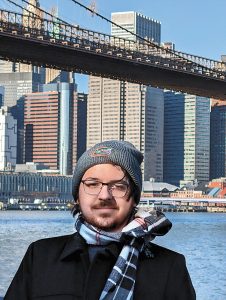 FFRF awarded Riley $750
FFRF awarded Riley $750
By Riley Barker
In many ways, the youth of today, known commonly as Generation Z, are seen in sharp contrast to previous generations. Growing up in a swiftly changing world flooded with the technological advances of the early 21st century has had a profound impact on the views and understanding of this generation.
With such rapid changes, previous norms and cultural practices have been put under a microscope or, in other cases, flat-out rejected by Gen Z. Of hot topics, religion comes to the forefront of scrutiny as many of my generation find themselves distancing from religious affiliation and questioning the doctrine preached as truth to us.
From my perspective as a member of Gen Z, I believe that modern-day usages of religion as justification for oppression have ignited a sudden change in the youth mindset that is leading toward a future focused on the power of the individual shaping their own life.
Religion has traditionally served as a basis of morality and lifestyle in a way that dictates one’s actions or thoughts. In many cases, the justification of religious reasonings has been increasingly stretched to cover broader and much more sensitive topics in a way that oppresses an individual or a group of people.
One such justification is used by opponents of the LGBTQ-plus community. From some traditional religious readings, a clear black-and-white depiction of gender and love is set as binary and only heterosexual. However, many members of my generation (as well as some members of previous generations) find themselves at odds with such hard-set definitions of who we are from people who don’t truly know us. While trying to discover themselves, members of my generation have become targets of hate and injustice by institutions of religion and those using religion as their justification. Persons in power have limited the freedoms of those finding themselves not fitting into the option of traditional gender types by forcing them to adhere to this system through limitations on bodily autonomy, informational applications, and explicitly targeting the discussion of LGBTQ-plus topics within education systems. With such staunch opposition to an individual trying to understand who they are separate from being told who they are, many have turned away from the origin of these antagonistic viewpoints.
In retaliation to the harshness expressed by those justifying themselves in religion, I have observed a focus on the individual self and what I believe to be a modern understanding of humanism taking shape. Put simply, humanism is a philosophy about people, the rights of people, and the individual is among and a part of a larger humanity. Beyond being just a philosophy, I have seen it become a beacon of light for individuals to express themselves as they wish and understand that they have a right to express themselves as such.
Rather than us being dictated to by a power beyond our understanding and the interpretations of such a being’s will, we are our sole voice of destiny and seekers of understanding. To me, it affirms that, in some cases, there is currently no set answer to the questions that we pose ourselves, and due to this we are forced to discover this answer by ourselves for ourselves.
With this new understanding emerging in myself and many of my fellow Gen Zers, I cannot help but marvel at the future that does not impose or oppress the individual, but, instead, asks them to question and seek meaning solely unique to themselves. Continuing down the current path of applying a singular answer to a wide range of individuals dismisses one’s sense of self, but allowing each person to seek their own understanding strengthens both the power of the individual as well as the power of humanity, made up of every generation.
Riley, 22, attends University of Florida, where he is majoring in architecture.
“From a young age, I have been a deeply inquisitive and curious person,” Riley writes. “My primary curiosities include architecture, philosophy, history, sociology, nature, literature and design. Due to some volunteering in my teenage years (food banks and libraries), as well as being a part of a variety of social circles through my education, I have been exposed to an expansive group of individuals who remind me that everyone is unique.”
